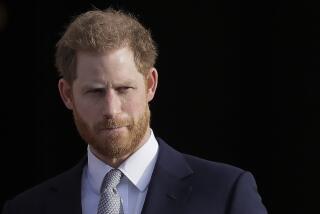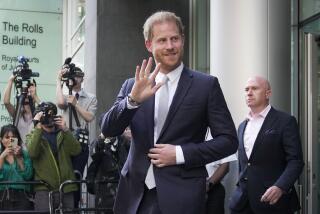Gordon Brown accuses Rupert Murdoch’s papers of snooping on him
- Share via
Reporting from London — In a startling turn in Britain’s phone-hacking scandal, former Prime Minister Gordon Brown on Tuesday accused Rupert Murdoch’s newspapers of hiring “known criminals” to ferret out information on him and his family, including his personal finances and his infant son’s medical history.
The former British leader told the BBC that the decision by the tabloid the Sun in 2006 to publicize his younger son Fraser’s diagnosis of cystic fibrosis, not long after Brown and his wife learned of it themselves, had left the couple “in tears.” Brown was Britain’s chancellor of the exchequer, or finance minister, at the time.
Without citing specifics, he said there was “absolute proof” that the people engaged by the Sun and the Sunday Times, one of Britain’s most prestigious newspapers, to dig up private details on him had links to the “criminal underworld.”
“These links have now got to be explored,” Brown said. “I find it quite incredible that a supposedly reputable organization made its money, produced its commercial results, at the expense of ordinary people by using known criminals.”
News International, the British subsidiary of Murdoch’s media giant News Corp., said in a statement Tuesday that the Sun had come by the information on Brown’s son legally, through someone who passed it along because a relative suffered from cystic fibrosis and who therefore wanted to draw attention to the disease.
Brown’s surprising allegations marked a widening of the hacking crisis beyond the News of the World tabloid to other properties owned by Murdoch, including the Sun and the more respected Times of London and Sunday Times.
His statement came on a day when Britain’s storied Scotland Yard underwent bruising criticism for failing to act earlier and more strongly in the phone-hacking scandal, despite evidence that thousands of people might have been targeted by the now-defunct News of the World.
Lawmakers grilled John Yates, one of Scotland Yard’s most senior officers, as to why he decided not to reopen the investigation into the alleged hacking two years ago, even though the police were sitting on evidence that the practice was more widespread than originally thought. A previous probe had concluded that the hacking was the work of a single rogue reporter who was jailed for the offense in 2007.
Yates said he took responsibility for what turned out to be a bad decision, but he blamed the News of the World for not cooperating fully with the first investigation. Lawmakers scoffed at those remarks as “unconvincing.”
“How many criminals do cooperate with their own incrimination?” Chris Bryant, an opposition lawmaker with the Labor Party, said to the BBC. “Police officers are meant to investigate.”
Yates was one of several senior police officials to be questioned by a parliamentary committee in an unusually tense and hostile session.
In a sign of how fraught the scandal has become, lawmakers asked at least two of the officers point-blank whether they had accepted bribes from journalists for information, as some of their subordinates are accused of doing. They said no.
The hacking allegations are now the subject of one of the most wide-ranging operations underway at Scotland Yard. Only 170 of the nearly 4,000 people whose cellphones may have been hacked have been notified that they were potential targets of the snooping, Sue Akers, the officer in charge of the renewed investigation, told lawmakers.
The scandal has become so serious that another parliamentary committee wants to question Murdoch; his son James, the chairman of News International; and Rebekah Brooks, the company’s chief executive.
Adding to Murdoch’s woes, the House of Commons is expected to debate a motion Wednesday calling on News Corp. to withdraw its $12-billion bid to take over BSkyB, Britain’s biggest satellite broadcaster.
The motion, sponsored by the Labor Party, is expected to pass with support from all of Britain’s major political parties, including Prime Minister David Cameron’s Conservatives. The move would be an extraordinary intervention that would have been unimaginable only a week ago, before the scandal sparked national indignation.
More to Read
Sign up for Essential California
The most important California stories and recommendations in your inbox every morning.
You may occasionally receive promotional content from the Los Angeles Times.











